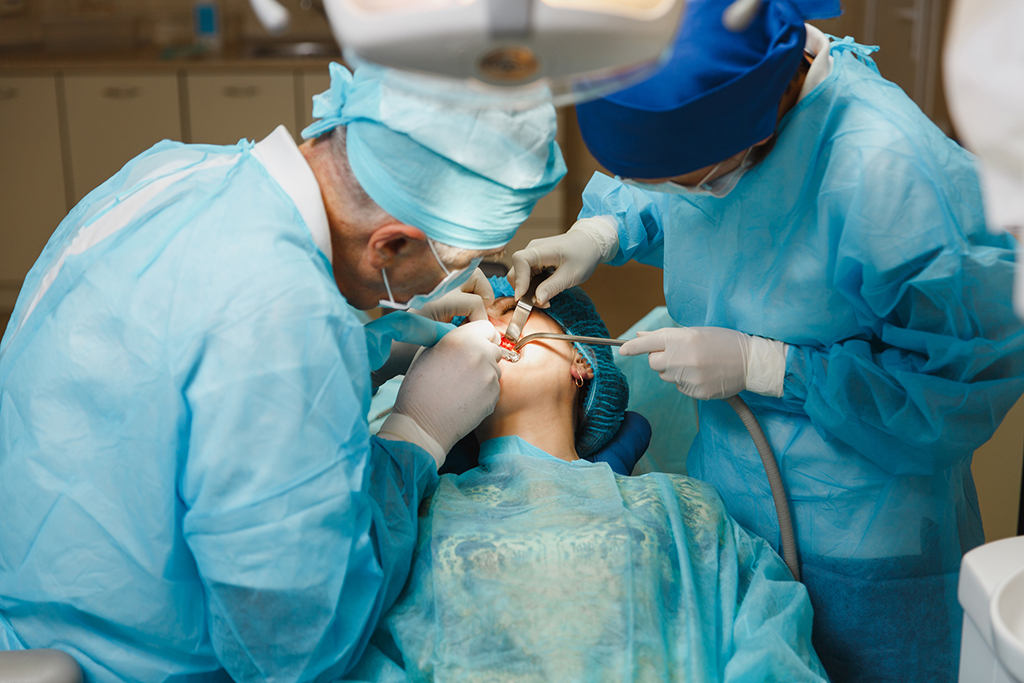
Oral Surgeon Procedures Performed At NextGen OMS | Plano, TX
Photo By ViDi Studio at istock
In addition to extracting wisdom teeth and providing dental implants, an oral surgeon at NextGen OMS performs a variety of other oral surgical procedures. While extractions and dental implants are the most common oral surgeries requested by TX patients, our doctors also specialize in the following:
Bone Grafts
Loss of jawbone density due to periodontal disease, atrophy from missing teeth or other serious oral infection may need bone graft surgery to reconstruct the jawbone. Grafts are taken from autogenous (the patient’s body) bone or synthetic, bone-like material. Once in place, bone grafts promote regeneration of weakened dental bone to improve overall oral health. Some people who want dental implants may need a bone graft if the bone supporting their teeth lacks sufficient density.
Following a tooth extraction, your Plano, TX oral surgeon may recommend a type of bone graft called a “socket preservation” if you want to eventually have a dental implant. Socket preservations ensure the height and width of the bone remains sufficient enough to support a dental implant.
Salivary Gland Tumors
The most common type of tumor an oral surgeon removes from the salivary glands is called a pleomorphic adenoma. Although they are almost always benign and slow to grow, pleomorphic adenoma tumors should be removed to eliminate the chance they could become cancerous. In addition, benign salivary gland tumors can grow until they start deforming the neck and lower face.
Signs of a possible salivary gland tumor include:
- A swelling or lump in your mouth, neck or around the jawline
- Facial numbness
- Muscle weakness involving only one side of the face
- Difficulty swallowing
- Pain near a salivary gland
- Inability to open the mouth all the way
Certain factors increase the risk of having benign salivary gland tumors, such as being over 50 years old, having a history of working around rubber manufacturing and plumbing chemicals and exposure to radiation treatment.
Since signs of benign and cancerous salivary gland tumors are the same, any abnormal swelling or lump at the jawline or on the neck should be examined as soon as possible by an oral surgeon at NextGen OMS.
Oral Biopsies
An oral surgeon removes a small piece of mouth, tongue or gum tissue for the purpose of detecting cancer cells is called a biopsy. If your doctor suspects you may have oral cancer, your doctor will likely refer you to a surgeon for a more thorough examination and possible biopsy.
An incisional biopsy involves cutting out of a tissue sample for testing. This provides an excellent sample for pathologists to evaluate for cancer. Depending on where the suspicious area is (inside of the cheek, tongue, throat, etc), this type of biopsy may need a few stitches afterwards.
If the swelling or lump is anywhere on the neck, a fine-needle aspiration biopsy performed by an oral surgeon is commonly used to extract cells or fluid from the swelling using a thin needle.
Oral Reconstruction Surgery in Plano, TX
Surgery that improves or restores facial, jaw and neck symmetry following tumor removal, trauma or severe oral infections is called oral reconstruction surgery.
Conditions treated with oral reconstruction surgery include but are not limited to:
- Facial bone deformities resulting from trauma or cancer
- Tumor removals that leave hollows or dents in the head and neck
- Severe jawbone deterioration caused by oral infections such as periodontitis
- Cleft palate/lip deformities
Oral reconstructive surgery can involve one or more of the following procedures:
Skin grafts for repairing gum, tongue and other soft tissue deformities
Skin flap reconstruction that involves using a flap of muscle, fat or skin to repair a mild to moderate deformity. During a flap reconstruction, an oral surgeon will also perform microsurgery on tissue flaps to attach blood vessels. This ensures blood will flow to areas where flaps are used.
Bone reconstruction may be needed to restore lower and/or upper jawbone symmetry and strength. Special software is utilized to generate before and after images to assist surgeons in completing the reconstruction. In some cases, an oral surgeon may use a piece of the patient’s shoulder blade or lower leg bone (fibula) to restore a damaged jaw. Removing bone tissue from another part of the body is a safe procedure that does not cause a disability or other medical issue.
Nerve grafts may be needed when reconstruction surgery diminishes innervation. A nerve graft involves a surgeon removing a nerve or nerves from other parts of your body and inserting them in the non-innervated area.
Dental implants help restore a patient’s chewing abilities when teeth have been removed during tumor removal surgery. A dental implant is a synthetic tooth attached to a metallic tooth root implant. An oral surgeon initially inserts the root implant into the socket where a tooth used to be. Once supporting bone forms a strong bond around the implant, the surgeon then secures the tooth onto the implant.
Types of Anesthesia Used During Oral Surgery
NextGen OMS takes great care in making sure our patients are as comfortable as possible during any oral surgery. That’s why we offer several anesthesia options:
Local anesthesia
Dental implants and minor oral surgery typically only needs an injectable numbing agent to minimize discomfort. Local anesthesia eliminates pain during and after the procedure. Numbness wears off within several hours of having minor oral surgery.
IV Sedation
Patients having wisdom teeth extracted or and an oral surgery that take more than an hour to complete may be given IV sedation. After an IV is inserted and the sedating solution begins entering your body, you will be in a sleep-state for a short time. Patients have little to no memory of the procedure. If you have oral surgery with IV sedation at NextGen OMS, you will need someone to drive you home.
General Anesthesia
Also administered through an IV, general anesthesia is stronger than IV sedation and will put you completely to sleep. Longer, more complicated oral surgeries like a partial or full reconstruction require patients be given general anesthesia.
To learn more about our many oral and maxillofacial services in TX, please contact NextGen OMS today to schedule a consultation appointment.


